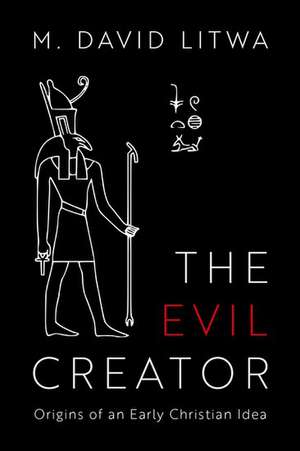The Evil Creator: Origins of an Early Christian Idea
Autor M. David Litwaen Limba Engleză Hardback – 23 noi 2021
Preț: 437.24 lei
Preț vechi: 485.19 lei
-10% Nou
Puncte Express: 656
Preț estimativ în valută:
83.67€ • 86.83$ • 69.94£
83.67€ • 86.83$ • 69.94£
Carte disponibilă
Livrare economică 12-18 februarie
Preluare comenzi: 021 569.72.76
Specificații
ISBN-13: 9780197566428
ISBN-10: 0197566421
Pagini: 224
Dimensiuni: 163 x 241 x 20 mm
Greutate: 0.49 kg
Editura: Oxford University Press
Colecția OUP USA
Locul publicării:New York, United States
ISBN-10: 0197566421
Pagini: 224
Dimensiuni: 163 x 241 x 20 mm
Greutate: 0.49 kg
Editura: Oxford University Press
Colecția OUP USA
Locul publicării:New York, United States
Recenzii
Nevertheless, the book offers an extremely helpful and compelling exploration of the various voices in the early Christian centuries who held this view, making clear that it was sufficiently widespread that it cannot be explained as a late anomaly.
It is a highly recomendable book which will introduce its readers in a world of practice and reflection on how people developed novel Jewish forms of life in the aftermath of the crisis of the first and second major Jewish revolts against the Romans, and the re-writings of these debates in later times.
The Evil Creator is a thoughtful and historically-responsible reading of the Bible. Examining the Creator Deity of the Bible through the lens of various early Christian interpreters who themselves long ago identified many of the same concerns that modern interpreters struggle with today makes this book not only a valuable contribution to the field of Biblical Studies but also important for modern readers who ponder the God of the Bible.
David Litwa is to be congratulated for this book, which is both well-researched and thought-provoking. He compellingly delineates here how the idea of an inferior creator-God arose directly from what was said in some of the earliest and, for many, sacred Christian texts, including Paul's letters and the Gospel of John.
Readers interested in why so many ancient Christians concluded that the creator was evil have here in one book an extremely well-researched assemblage and exposition of evidence suggesting answers. Litwa reviews the role of indigenous Egyptian myth, Graeco-Roman philosophical argument, and above all, interpretations of Jewish and Christian scripture. His sobering concluding chapter reviews how ancient evil-creator doctrines live on today. An important contribution on a perennial theological challenge.
This book should be taken in the context of early theological divisions between ancient Jewish and early Christian sects and used to deepen our understanding of the extreme changes theological positions can take over time.
It is a highly recomendable book which will introduce its readers in a world of practice and reflection on how people developed novel Jewish forms of life in the aftermath of the crisis of the first and second major Jewish revolts against the Romans, and the re-writings of these debates in later times.
The Evil Creator is a thoughtful and historically-responsible reading of the Bible. Examining the Creator Deity of the Bible through the lens of various early Christian interpreters who themselves long ago identified many of the same concerns that modern interpreters struggle with today makes this book not only a valuable contribution to the field of Biblical Studies but also important for modern readers who ponder the God of the Bible.
David Litwa is to be congratulated for this book, which is both well-researched and thought-provoking. He compellingly delineates here how the idea of an inferior creator-God arose directly from what was said in some of the earliest and, for many, sacred Christian texts, including Paul's letters and the Gospel of John.
Readers interested in why so many ancient Christians concluded that the creator was evil have here in one book an extremely well-researched assemblage and exposition of evidence suggesting answers. Litwa reviews the role of indigenous Egyptian myth, Graeco-Roman philosophical argument, and above all, interpretations of Jewish and Christian scripture. His sobering concluding chapter reviews how ancient evil-creator doctrines live on today. An important contribution on a perennial theological challenge.
This book should be taken in the context of early theological divisions between ancient Jewish and early Christian sects and used to deepen our understanding of the extreme changes theological positions can take over time.
Notă biografică
M. DAVID LITWA is a scholar of ancient Mediterranean religions with a focus on early Christianity. He has taught courses at the University of Virginia, the College of William & Mary, and Virginia Tech. He is the author of recent publications including Desiring Divinity, How the Gospel Became History: Jesus and Mediterranean Myth, and Posthuman Transformation in Ancient Mediterranean Thought: Becoming Angels and Demons. He is currently Research Fellow at the Institute for Religion and Critical Inquiry at Australian Catholic University in Melbourne.
